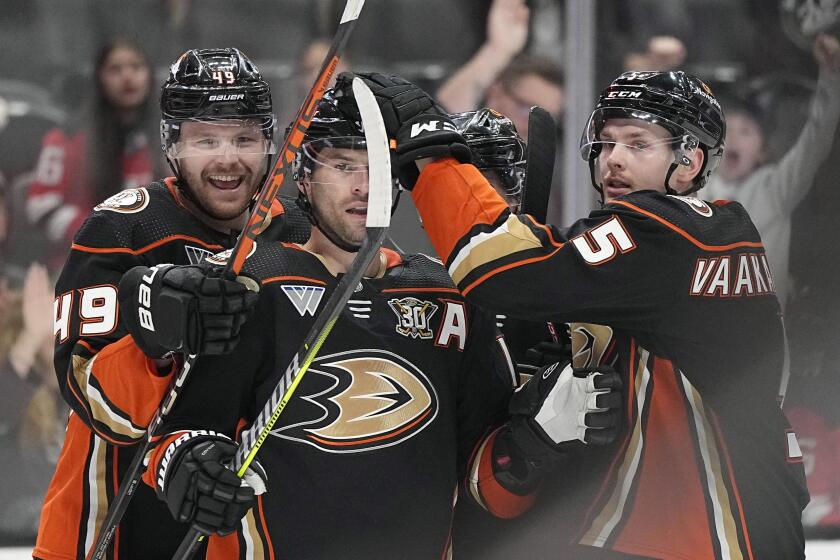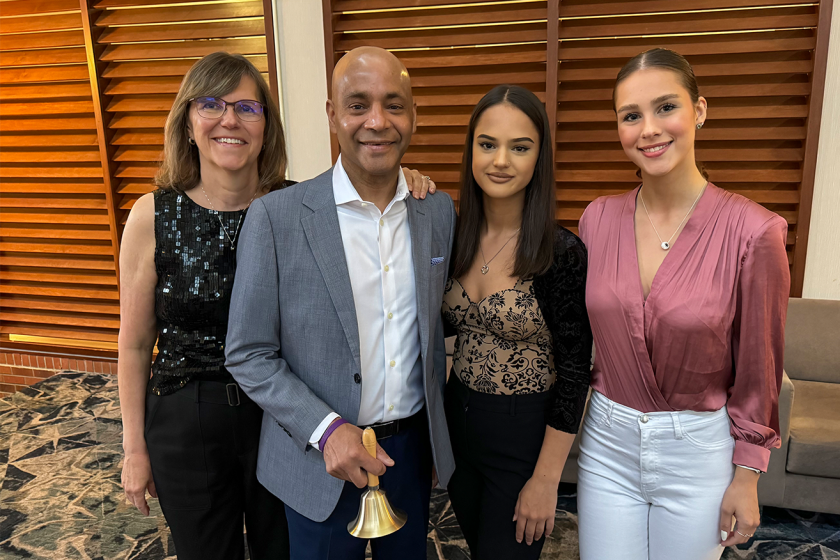College players eager to go pro
MINNEAPOLIS -- Christmas was coming, final exams were finished and Kyle Okposo was preparing to fly to the Czech Republic. There, he would play for Team USA in the prestigious world junior tournament.
Okposo got up on a Sunday morning and groggily greeted his mother, who asked him how he slept.
“He said, ‘I didn’t,’ ” Michele Okposo said.
All the tossing and turning that December night preceded Okposo’s decision to leave the University of Minnesota in the middle of his sophomore season and sign a three-year contract with the New York Islanders.
Gophers Coach Don Lucia was displeased, to put it kindly, by the timing.
His team, traditionally one of the strongest programs in the country, has been depleted by early departures and was in a decidedly unfamiliar position entering this weekend: eighth place in the Western Collegiate Hockey Association.
In the last two years, eight players have left Minnesota before their eligibility expired. The 10-team WCHA has lost more than 30 during that time, an exodus partially attributable to new rules in the NHL’s collective bargaining agreement that took effect after the 2004-05 lockout.
“I don’t think there’s any question it caught up to us,” Lucia said. “We got behind the curve, and we didn’t see it coming.”
Ironically, the new CBA was designed to keep players from turning pro too soon by capping entry-level salaries and bonuses. But teams are motivated by the fear of losing rights to top prospects, so the signing pressure remains.
Plus, the caps have allowed clubs to actually add more drafted players to the fold in a given year without spending more money. Also, liberalized free agency has allowed players -- once they’re well into their NHL careers -- to make millions faster than before.
This issue is more complicated than in other major sports because of the variety of avenues to the NHL. At the other extreme is football, for example, where almost all new players come directly from American colleges.
In hockey, Canadian junior leagues are a prime source of new talent, and Europe is a major contributor. Even in the U.S., there are decisions to make between college, juniors and the national team development program in Michigan.
Concerns about the relationship between the colleges and the pros prompted the formation of a committee that includes six major conference commissioners and seven NHL general managers. The commissioners paid an introductory visit to the GM meetings in Florida last week.
“Obviously the relationship is something that’s important from the league’s perspective and our clubs’ perspective. I don’t think that’s ever changed,” NHL deputy commissioner Bill Daly said.
The part of Okposo’s departure that was hardest for Minnesota to take was that he had declined an offer last summer to sign with the Isles, who made him the seventh overall pick in the 2006 draft. Okposo was eager to play at least one more season at renowned Mariucci Arena and live the college life for another year.
That changed when Islanders General Manager Garth Snow came back with an increase of the club’s original offer, encouraging Okposo to turn pro. For a 19-year-old determined to make a successful career out of his skills on the ice, the opportunity was too good to wait for.
“Life has funny twists and turns,” Michele Okposo said, adding: “Kyle was just sick about leaving.”
Snow, a former goalie who graduated from Maine and played for the Black Bears in the 1993 national championship game before 12 seasons in the NHL, described his college experience as one he’ll “cherish” the rest of his life.
In December, though, Snow criticized Lucia’s coaching and claimed Okposo wasn’t improving. He argued the Islanders would do a better job of developing him.
Okposo has been playing for the Bridgeport Sound Tigers in the American Hockey League. In the equivalent of baseball’s Triple-A, Okposo had seven goals and 13 assists in his first 21 games.
He’s expected to see some time with New York yet this season. But if he appears in fewer than 10 games, his entry-level contract -- worth at least $2.5 million and potentially double that if he meets several performance incentives -- won’t kick in until next year.
“We wanted to do what’s best for Kyle and what’s best for our organization,” Snow said. “We have a lot of very knowledgeable hockey people on my staff who know exactly what it takes to be a pro hockey player. Their credentials speak for themselves.”
Minnesota and the WCHA have a different view.
“The reality is very few players are going to make a living in the NHL,” Lucia said. “There might be players that get a cup of coffee and play some games, but you’re going to have to find out what to do when hockey’s over. It’s a lot different to try to come back to college at age 27, 28 or 30. You might be married and have a young child. I’ve always maintained the perfect scenario is that you leave college with a degree and the best four years of your life, and then go onto play in the NHL. If you’re good enough and you take care of yourself, you’ll have all the money you’ll ever need.”
WCHA commissioner Bruce McLeod has proposed a July 15 deadline for college players to decide whether to turn pro or commit to another season in school. That, and any other potential changes, would have to be approved by the league and the union in the next CBA.
The NHL Players’ Association declined immediate comment on the matter. Daly expressed an openness to address colleges’ concerns.
“It can’t work to the detriment of the player such that players are going to feel they’re disadvantaging themselves getting to the NHL by enrolling in college,” Daly said. “It has to be palatable to the student-athletes themselves.”
Part of the issue is simply the natural force of an increasingly hurried society. There is pressure from everywhere these days to speed up the process, no matter the area of life.
The Wild’s Mark Parrish, a 10-year NHL veteran, left St. Cloud State after two seasons to sign with the Colorado Avalanche in 1997. He’s seen the game from all different sides, and his experience has yielded a diplomatic analysis.
“I’ve always kind of been a believer that it comes from within,” Parrish said. “It comes from the guy. If he wants it bad enough, he’s willing to work hard enough, then it doesn’t matter what league he’s in. His development is going to keep progressing.”
Go beyond the scoreboard
Get the latest on L.A.'s teams in the daily Sports Report newsletter.
You may occasionally receive promotional content from the Los Angeles Times.



